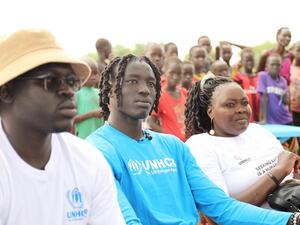80,000 internally displaced people return home to southern Yemen
80,000 internally displaced people return home to southern Yemen

The internally displaced people who UNHCR registered after they fled fighting are heading back to their homes in southern Yemen.
GENEVA, 16 November (UNHCR) - The UN refugee agency has helped more than 80,000 internally displaced Yemenis return to their homes in the south of their country, the first significant fall in the number of displaced in the area since fighting erupted 18 months ago.
"In southern Yemen, UNHCR is seeing growing numbers of internally displaced people returning to their homes," UNHCR spokesman Adrian Edwards told a news conference. "Over the past four months, and working with the Yemeni authorities, we have helped more than 80,000 people go home, and further returns are on-going. "
The decline in displacement follows the re-establishing of government authority in the southern province of Abyan in July.
"This is the first significant displacement decline since May 2011 when fighting between government troops and militants erupted in the south of Yemen," Edwards said.
Initially, returns were slow due to the widespread presence of landmines and unexploded ordnance, as well as extensive damage to infrastructure. In many cases people also wanted to see more evidence of improved security. However, after de-mining by the Yemeni government and other improvements in security more families are now making the decision to return.
Many of the returns have been from Aden, where more than 23,000 of the 25,000 IDPs who were sheltering in schools and other public buildings have now returned to Abyan. This has allowed normal teaching to resume, although schools still need repairs after having served as IDP sites for over a year.
The 1,500 IDPs still living in Aden schools will be relocated into eight buildings that UNHCR, with the agreement of the government, is rehabilitating to serve as temporary accommodation.
The government has been covering transportation costs - around US$70 per family -- for people returning to Abyan. Security personnel man checkpoints along the route to ensure safe passage, and in Abyan itself UNHCR and other agencies are providing further support.
As the lead international agency responding to IDP and returnee needs for shelter UNHCR has distributed shelter repair kits to some 32,000 people, and non-food items packages to 33,000 people. These packages include mattresses, blankets, kitchen sets, plastic sheeting and tools. UNHCR plans to help 180,000 people in Abyan with shelter and non-food relief kits.
"Currently, the challenges include widespread damage to property and infrastructure, a still fragile security situation, and patchiness in provision of public services," said Edwards. "Continuing international support and stable security will be essential for returns to become sustainable, and particularly if internal displacement in southern Yemen is to be brought to an end during 2013."
Meanwhile in northern Yemen more than 300,000 people are still displaced from a conflict that has been running on and off since 2004 between Yemeni government forces and al Houthis. Insecurity continues to hinder returns there, while tribal clashes earlier in 2012 generated over 6,000 new IDPs in the northern governorates.
Despite the challenges it faces, Yemen remains one of the most generous refugee hosting countries with over 232,000 refugees, mainly Somalis. While 2011 saw a record new influx of 103,000 refugees and migrants, so far in 2012 there have been over 90,500 new arrivals, mainly Ethiopians.
UNHCR Yemen carries out its crucial humanitarian interventions throughout the country with nine offices and some 200 national and international staff on the ground, In 2011 UNHCR's national implementing partners Society for Humanitarian Solidarity (SHS) received the Nansen award for their life-saving assistance to the thousands of refugees and migrants who arrive on the shores of Yemen every year after crossing the Gulf of Aden by boat.








